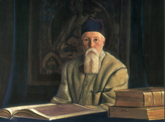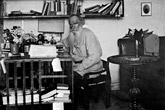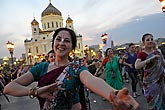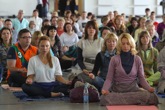Spiritual traffic should be two-way between India and Russia

Mahatma Gandhi was deeply influenced by Lev Tolstoy. Source: wikipedia.org
In his book ‘Altai-Himalaya. A Travel Diary,’ Nicholas Roerich mentioned a brief conversation with a man in Siberia who told the great writer and philosopher that he considered India the cradle of civilization. Even in the 1920s when information was really hard to come by in the distant outposts of Russia, there were many who believed that India held some ancient secrets to salvation. In 2013, many of India’s ashrams and spiritual centres from Rishikesh in the north to Puttaparthi in the south have long-term Russian visitors and residents in search of answers. When it comes to spiritual salvation, Russia may also have some secrets of its own that can be of use to Indians.
Mahatma Gandhi learnt a lot from Leo Tolstoy, whose book ‘The Kingdom of God Is Within You,’ influenced the Indian leader to take up a non-violent resistance in the freedom struggle. Tolstoy’s beliefs that one could find happiness by striving for inner self-perfection through loving one's neighbour and God are shared by many of the great Indian spiritual gurus of this age. The works of some of the great Russian writers of the 19th century had deeply spiritual messages. “The Russian yearning for the meaning of life is the major theme of our literature,” Nicholas Berdyaev once remarked, adding “and this is the real point of our intelligentsia's existence.”
Spirituality is something that is by no means the monopoly of the intellectuals of Russian society. Fyodor Dostoyevsky wrote in detail of the spirituality of the simple Russian peasant of his era. Despite the fact that for close to seven decades, the concept of the “Russian soul” was frowned upon by the Soviet authorities, there was always an innate sense of spirituality from within when it came to the average Russian. The great open spaces of Russia are conducive to creativity, inner thought and reflection.
One great way for Indians to find the missing pieces of their own philosophical puzzle is to visit Russia’s great monasteries as well as some of the country’s natural wonders. After the honking, loud noises and the distractions of Indian life, the quiet of Russia can be an ideal place for an urban Indian to ‘find’ himself or herself.
Personally, I found the countryside by the Amur River or the forests in the area a wonderful place to mediate. These are some of the most sparsely populated areas on earth. Besides the fact that the nature is virtually unspoilt, these areas are totally free of the horrors of mass and commercial tourism that has wrecked havoc on many parts of the Himalayas. It is in the marvel of pristine nature, where one can have the greatest amount of concentration and focus.
Other Indians I have known have even tried stints at Russian Orthodox Monasteries. A yoga teacher from Calcutta spoke to me about a six-month experience in a monastery near Borovsk in the Kaluga region. The young man, who is fluent in Russian, described the experience as life-changing and said his interactions with the deeply spiritual monks were enlightening and added to his own pool of knowledge. “There’s no sense of rigidity that one gets when dealing with Western Evangelists and missionaries,” he said, adding that he was enamoured by the mysticism of the monastery.
The great Indian yogi Paramhansa Yogananda looked to advocate cultural and spiritual understanding between East and West, and the exchange of their best distinctive features. Russia’s large size and presence in many neighbourhoods has traditionally put it at the forefront of such exchanges despite the fact the country was closed to most of the outside world for the better part of the last century. Even Buddhism, a religion that originated in India, spread to the vast plains of Buryatia, where elements of Shamanism have been incorporated into the Dharma. Given the various influences that have permeated Russia over time, the country has a unique philosophical and cultural ethos that sets it distinctly apart from its various neighbours. A former Russian diplomat said the country could easily position itself as a bridge between East and West.
As many of India’s traditions fade with what many call the onslaught of Western culture, Indians can look at Russia as an example of how to integrate some of the best values from (at times) conflicting civilizations.
Afterthought:
Few Indians understood the Russian psyche better than Rabindranath Tagore. The Indian Nobel laureate, who read the great 19th century classics of Russian literature before visiting Russia, praised the Bolshevik Revolution for its immediately visible results in education but knew that such an ideology would never last permanently in a country where people valued individual freedom so much. “It is possible that in this age Bolshevism is the cure, but medical treatment cannot be permanent,” Tagore said, adding “the day when the regime prescribed by the doctor is lifted will be a celebratory one for the patient.”
All rights reserved by Rossiyskaya Gazeta.
Subscribe
to our newsletter!
Get the week's best stories straight to your inbox



